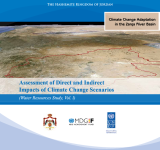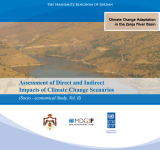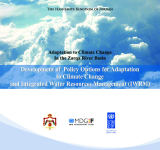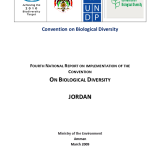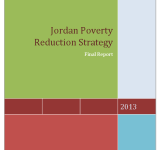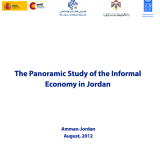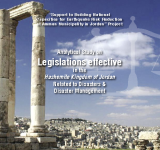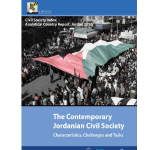Jordan
The study aims at optimizing the water allocation in the Zarqa River Basin (ZRB) through maximizing the net value added by considering the climate change scenarios developed by the team of the study. The current water allocation suffers from unmet demands. In the future;; more wastewater will be produced and more treated wastewater is expected to be used due to the increasing population and the increased connection rate and rehabilitation and expansion of the existing treatment plants;; allocating more treated wastewater for the irrigation sector would save the fresh water sources for the municipal sector. Currently the irrigation sector suffers high amounts of losses. An improvement in efficiency would contribute in saving more fresh water too. Volume One is a Water Resources Study and Volume Two is a Socio - economical Study.
The report is directed at drawing a picture of the prevailing legal and institutional frameworks of the water sector in Jordan in relation to climate change adaptation in the Zarqa River Basin (ZRB). To achieve this purpose;; three tasks were conducted;; (1) literature of pertinent documents on legislation;; administration;; regulations;; water policies and water laws were reviewed;; (2) address the gaps in the water policies in Jordan as related to climate change vulnerability;; and to raise awareness of the importance of developing climate change mitigation measures;; and (3) propose policy options for adaptation to climate change through implementation of IWRM as a tool. The objective of the revision is the assessing the appropriateness and effectiveness of the existing institutional framework regarding the climate change adaptation measures in ZRB. Combating water scarcity remains a strategic challenge that Jordan faces for augmenting its water resources.
This report was implemented by the Jordanian Ministry of Environment and is the forth national report on the implementation of the Convention on Biological Diversity. It provides an overview of biodiversity status;; trends and threats in Jordan;; current status of national biodiversity strategies and action plans and finally sectorial and cross-sectorial integration of biodiversity considerations in Jordan.
The Government of Jordan adopted its first Poverty Alleviation Strategy in 2002 recognizing poverty as a key development problem requiring a comprehensive policy for improving the lives of the poor and socially excluded;; increasing their human capabilities;; providing them with economic opportunities and fully integrating them in the society. Considerable progress in poverty reduction has been achieved. The Government has put in place a series of social programs aimed at increasing employment opportunities;; curbing unemployment;; combating poverty and offering in-kind and cash assistance for the poor and marginalized groups within Jordanian society
This study comes in as a second step that follows producing the diagnostic study “The Informal economy in the Jordanian Economy” which measures the informal economy in the Jordanian economy based on the Jordan Labor Market Panel Survey 2010This study aims to serve different goals as follows: (i) Providing a qualitative dimension to informality in Jordan;; (ii) Defining the factors that drive and motivate the informal economy;; (iii) Defining whom from the various segments of society are most affected by informality (iv) Focusing on the relation between informality and both youth and women;; (v) Testing the links and relations between informality and SMEs operation;; (vi) Showing which sectors are most affected by informality;; how and why;; (viii)Showcasing the regions in Jordan that demonstrate high rates of informality.
This study is an analytical study of the legislations effective in the Hashemite Kingdom of Jordan related to disasters and disasters management. It provides an overview of the disasters;; their types and management as well as an analysis of effective legislation related to disaster management in Jordan. The report concludes that To achieve consistency and integration among all ministries and public and private institutions concerned with facing disasters in all stages;; and to achieve the optimal use of available capabilities and resources as well as preventing duplication and overlapping which waste energies and in order to achieve the aforementioned disaster management principles;; there should be a certain authority responsible for disaster management in all its stages.
The Civil Society Index (CSI) is a participatory research project that seeks to assess the status of civil society organisations (CSOs). It is applied by practitioners in civil society and is dedicated to serving their interests globally. The CSI is based on a comprehensive methodology which was developed by CIVICUS: World Alliance for Citizen Participation and aims at assessing the status of the civil society;; as well as creating a database of knowledge that strengthens civil society and bolsters its role
